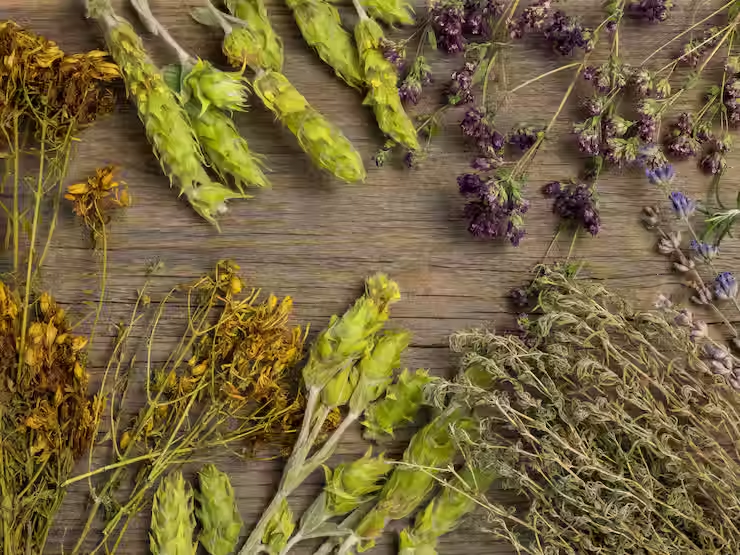The Wisdom of Traditions: Chinese, Ayurvedic & Western Herbs
- Jun 14, 2025
- 4 min read
Updated: Jul 17, 2025
Throughout history, plants have been humanity’s most reliable allies in healing. While each herbal system has evolved in its own cultural and environmental context, Chinese, Ayurvedic, and Western herbal traditions all aim to support the body’s natural ability to heal. When combined skillfully, these traditions create synergy—working together to produce effects greater than the sum of their parts.

Chinese Herbalism
Rooted in Traditional Chinese Medicine (TCM), Chinese herbalism takes a deeply energetic and systems-based approach to health.
Core Philosophy: Illness arises from imbalances in Yin & Yang, deficiency or excess of Qi (life force), Blood, and Jing (essence). Herbs are selected based on their energetic actions and their effects on specific Zang-Fu organs and meridians.
Formula Structure: Herbs are almost always used in complex formulas, with defined roles (chief, deputy, assistant, envoy) to enhance effectiveness and reduce side effects.
Focus: Chronic imbalances, internal organ disharmony, emotional wellness, immune and hormonal regulation, and promoting long-term equilibrium.
Example herbs: Rehmannia (tonifies blood and yin), Astragalus (Qi tonic), Schisandra (adaptogen, supports liver and lung)

Ayurvedic Herbalism
Developed in India over 5,000 years ago, Ayurveda is a complete medical science rooted in spiritual and elemental understanding of the human body.
Core Philosophy: Health is achieved by balancing the three doshas—Vata, Pitta, and Kapha—which represent bio-energetic forces that govern all bodily functions. Herbs are classified by taste (rasa), energy (virya), and post-digestive effect (vipaka).
Holistic Strategy: Treatment aims to detoxify the body, strengthen digestion (agni), calm the mind, and align the individual with their inherent constitution (prakriti).
Focus: Preventive care, digestive health, nervous system regulation, reproductive vitality, and mental clarity.
Example herbs: Ashwagandha (adaptogen and nervine), Triphala (digestive and detoxifier), Brahmi (nootropic and calming).

Western Herbalism
Rooted in European, North American, and Indigenous plant traditions, Western herbalism tends to focus more on physiological effects of herbs on organs and symptoms, while also honoring energetic plant actions.
Core Philosophy: Emphasizes symptom relief, organ detoxification, and strengthening systems like the immune, digestive, and circulatory systems.
Approach: Use of single herbs or simple blends, often with an understanding of actions such as diuretic, nervine, adaptogen, vulnerary, or antispasmodic.
Focus: Acute ailments, infections, inflammation, nervous system support, liver detox, and circulatory health.
Example herbs: Chamomile (soothing and anti-inflammatory), Milk Thistle (liver support), Echinacea (immune stimulant), Yarrow (anti-inflammatory, hemostatic).
Why Combine These Systems?
When herbal systems are skillfully integrated, the result is formulations that are more well-rounded, personalized, and effective. Here’s why synergy matters:
1. Whole-Being Support
Chinese herbs may regulate Qi and nourish the organs.
Ayurvedic herbs restore digestion and clear subtle energetic imbalances.
Western herbs offer targeted relief, organ detox, and direct anti-inflammatory or antimicrobial actions.Together, they address body, mind, and spirit—symptom and root cause.
2. Therapeutic Breadth
By combining these traditions, we expand the range of plant energetics:
Warming & cooling, stimulating & calming, drying & moistening—to match the person's current imbalance.
Herbs can be tonic, adaptogenic, anti-inflammatory, nervine, and detoxifying—in one formula.
3. Customizable Formulas for Individual Needs
A person with anxiety and digestive upset might need:
Nervines from Western traditions (Skullcap, Lemon Balm),
Adaptogens from Ayurveda (Ashwagandha),
Qi tonics from TCM (Licorice root or Bai Zhu).
Each herb supports a different level of healing—nervous system, endocrine system, digestion, and emotional balance—without redundancy or conflict.
4. Minimizing Side Effects
Traditional Chinese herbal formulas are crafted to balance and buffer effects—something we can apply when combining across systems. For instance, an intense liver-detoxifier from Western tradition might be buffered with harmonizing TCM herbs or gut-soothing Ayurvedic herbs.
5. Respect for Ancient Wisdom + Modern Insight
Many modern herbalists trained in integrative or functional medicine now combine all three systems. This allows us to:
Harness the time-tested safety and efficacy of traditional formulas,
Address modern stressors and environmental toxicity more effectively,
Stay adaptable to an individual’s changing constitution and lifestyle.

A Note of Caution: Not All Herbal Advice Is Created Equal
In today’s world, it’s easy to find long lists online or on social media saying, “This herb is good for stress” or “That herb helps detox your liver.” While it may sound helpful, this kind of one-size-fits-all advice can be misleading—and even harmful.
🌿 Herbs are powerful medicine.They affect not only the body, but the nervous system, energy flow, emotional state, and deeper organ function. Using the wrong herb—or the right herb in the wrong way—can disrupt more than it heals.
🌿 “Good for you” is not the same as “right for you.”Just because an herb supports the liver doesn’t mean it’s suitable for your specific liver condition, constitution, or current state of imbalance. For example, someone with a cold, deficient liver pattern needs different support than someone with hot, overactive liver function.
🌿 Throwing herbs together without knowledge of synergy, dosage, or energetic actions may create ineffective—or even conflicting—blends.
That’s Why Wholehearted Harmony Is Here

At Wholehearted Harmony, we take the time to understand you and your animals as individuals. We blend with intention, education, and deep respect for the traditions we draw from. Every formulation—whether custom or pre-made—is created to ensure that the right herbs are used in the right way, for real results.
This isn’t fast, fad-based wellness.This is true herbal harmony.



This is wonderful and makes so much sense. I have taken herbs in the past without much result and this explains why. I am grateful to have found this site and your knowledge. Thank you!